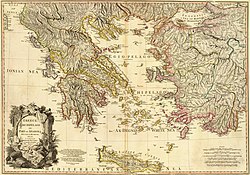History of the Hellenic Republic
| History of Greece |
|---|
 |
|
|
The history of the Hellenic Republic constitutes three
First Hellenic Republic (1822–1832)
The First Hellenic Republic (
In 1827, the Third National Assembly at Troezen selected Count Ioannis Kapodistrias, who had previously been in Russia's diplomatic service, as Governor of Greece for a term of seven years. He arrived in Greece in January 1828 and established the Hellenic State, ruling with quasi-dictatorial powers. He was assassinated by political rivals in 1831 and was succeeded by his brother, Augustinos Kapodistrias until in 1832 the Great Powers declared Greece a Kingdom and selected the Bavarian Prince Otto to be its king.
Second Hellenic Republic (1924–1935)
The Second Hellenic Republic (
The first President of the Hellenic Republic was
Despite a period of stability and relative prosperity under the last government of
Following the outbreak of another
Third Hellenic Republic (1974–present)
The current
The Junta had already held a staged
After the fall of the regime and the return to civilian rule in August 1974 however, the legal and constitutional acts of the Junta were deemed invalid, and a new
